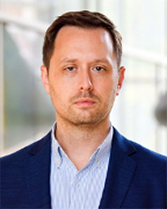Seminars
Prof. Tyler N. Tallman
School of Aeronautics and Astronautics
Purdue University
Computational Mechanics in the Self-Sensing Inverse Problem

ABSTRACT: Many materials—carbon fiber composites, nano-engineered polymers and cements, physiological tissue and biomedical materials, and, among others, semi-saturated soils—exhibit coupling between their mechanical state and their electrical state. Quick and easy-to-collect electrical measurements can be used to detect and localize mechanical effects in these materials; however, we are often not interested in the electrical state of the material. We would much rather know the underlying stress, strain, deformed shape, or damage state that gives rise to a particular set of electrical observations. This is the heart of the self-sensing inverse problem: Given a limited set of electrical data and a model relating electrical transport to mechanics, can the full-field mechanics of the material be quantitatively deduced? Solving this inverse problem has exciting implications, such as continuous knowledge of in-operando mechanics for aerospace and civil structures, proprioception in soft robotics, tissue mechanics imaging under high-rate loading, and many more. This talk will provide motivation for the self-sensing inverse problem, derive and discretize its basic form, present computational and experimental results to date, and discuss future challenges and directions for this research area.
BIOGRAPHY: Dr. Tyler N. Tallman is an Associate Professor in the School of Aeronautics and Astronautics at Purdue University. He earned BS degrees in physics and engineering mechanics from the University of Wisconsin-Eau Claire and the University of Wisconsin, respectively, in 2010. He earned his MS in 2012 and PhD in 2015, both in mechanical engineering and from the University of Michigan. Dr. Tallman's research interests exist at the intersection of multifunctional materials, embedded sensing, and inverse problems applied to nondestructive evaluation, structural sensing, biomedical imaging, and additive manufacturing, areas in which he has authored or co-authored nearly 100 combined journal papers, conference proceedings, abstracts, and patents. His research contributions have been recognized by winning the AFOSR YIP Award, the NSF CAREER Award, and several best paper awards from ASME in addition to serving as an associate editor for the Journal of Intelligent Material Systems and Structures. Dr. Tallman is also a passionate educator. He has won the Elmer F. Bruhn and W. A. Gustafson teaching awards from the Purdue University School of Aeronautics and Astronautics and the Faculty Excellence Award in Early Career Teaching from the Purdue University College of Engineering